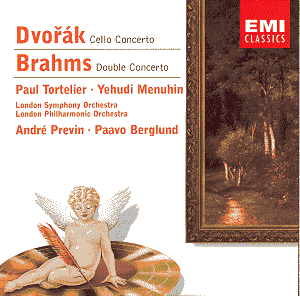There is perhaps no greater treasure trove of recorded
music in the world than that which lies in the vaults of EMI. One of
the oldest record labels in the world, EMI sits on a gold mine of great
performances from some of the world’s finest artists. Shame it is then,
that they do not dig deeper and release even more of their long cost-recuperated
material for us to enjoy once again.
Be that as it may, there are still reasons for rejoicing
in the "Great Recordings of the Century" series, and now this
presumably middle-to-budget price series entitled encore. This
arrives on the scene complete with a trendy all-lower-case logo and
eye-catching if not overly informative program booklets.
The series is dedicated, of course, to warhorses and
seasoned soldiers, and this combination is at the head of the line.
Of all the great cello virtuosi of the last century, there was probably
none more capable of fine cantabile playing than Paul Tortelier. Both
as soloist and collaborator, there is little fault to find in the playing
of this grand gentleman of music. We also have him to thank for bringing
out the talents of Jacqueline DuPre, whom he taught for some years.
The late Sir Yehudi Menuhin, while one of the art’s finest spirits,
brought forth his most outstanding work at a very young age. In his
later years, intonation was always an issue, and there were questions
as to the solidity of his technique as well. Nonetheless, Menuhin, the
musical humanitarian, continued to prosper in the musical establishment,
and achieved legendary status during his lifetime.
There is little to say about these two well-known works.
The Dvořák concerto is arguably the
greatest work of its kind in the repertoire. Packed with drama and tunefulness
and with virtuosity to burn, this is definitely a ‘desert island’ work.
Tortelier turns in a near flawless performance, perfectly balanced and
executed with astounding ease and command. Brahms’ double concerto,
so unique, receives an equally outstanding performance. The whole disc
is worth the money just to hear these fine players in the gorgeous compound
metered middle movement.
Accompaniments by both orchestras are excellent. These
performances, of course, have already earned their keep in the catalogue,
and do not need my meager help to promote them. Suffice it to say that
if you have no recordings of these works, this is a choice that is beyond
safe. If you do, then add these to your musical wine rack for status.
Program notes are minimal, but attractive. You get
what you pay for. Analog sound quality is fine. Recommended without
hesitation.
Kevin Sutton
